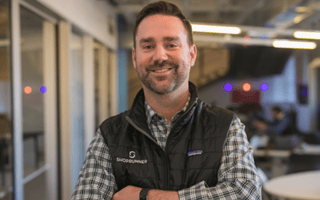
ShopRunner CTO Greg Ball is a bit of a product person. But don’t take our word for it.
“Building new products is what gets me out of bed every day,” he said.
Ball’s love of building products is a significant reason why he joined ShopRunner, a fast-growing subscription service that offers free, two-day shipping and returns at more than 140 online stores. Before joining the company, Ball was VP of technology at Orbitz — a company where size can occasionally stymie the product development process.
“At ShopRunner, we can move faster and make decisions more quickly,” said Ball. “We can literally decide something in the morning and then start working on it in the afternoon.”
That quick turnaround time is welcomed, as ShopRunner has a multitude of projects in the works. We spoke to Ball to learn more about what his team is working on, his approach to leadership and what he looks for when hiring.
You were at Orbitz prior to joining ShopRunner. What drew you to the company?
ShopRunner CEO Sam Yagan is fantastic. You can’t ask for a more proven entrepreneur or better leader to work with. I also liked where the business was at in its life cycle. ShopRunner is healthy and established, but Sam’s observation is that there’s still room to innovate and build new products that will take us to the next level. Building new products is what gets me out of bed every day. This really was a unique opportunity to join a healthy business with a lot of new projects in the pipeline.
There are people who want to help you become the company you’re going to be, and then there are people who only want to join you once you’re there. We try to only hire the former.”
Since you’ve joined ShopRunner, what’s the biggest tech hurdle your team has had to overcome?
Evolving our infrastructure to deal with the massive amount of data we collect and make it useful. We’re collecting a bunch of data across the network and would ideally be in position to see trends that happen in the marketplace. We’re putting tools in place so we can analyze that data at scale. It’s been challenging but we’ve made great progress.
When starting on a project, how do you decide what technologies to use? Specifically, what’s your approach to evaluating new technologies?
A lot of it is pretty organic and based on the needs of what we’re building. We examine what’s evolving in the marketplace and also what’s of interest to our engineers. We like to use technologies that our engineers think are both fun and will be super useful for the project. We always look to find the best tool for the job, and if there’s a tie then we go with what everyone is most excited about.
Can you talk about those tools or the projects your team is currently working on?
We’re making a bunch of investments in data science and engineering. We’ve got a lot of customers on our platform and merchants on our network, which means there’s a lot of data coming through. This presents the perfect opportunity to evolve our product to better match customers with merchants. Some of what we’re working on will end up powering some mobile applications we hope to re-launch later this year.
Tell us about your approach to leadership.
I’m fairly detail-oriented. I really need to see a product and understand how it works in order to engage from a leadership perspective. That being said, I was really influenced by a Dan Pink TED Talk on autonomy meaning and mastery and the things that bring happiness to people when they come to work. I try to give my team some autonomy and make sure they understand why they’re building what they’re building so it has some meaning.
ShopRunner’s Chicago-based engineering team is rapidly growing. What positions are you hiring for right now?
We’re sort of looking in all areas: data science, data engineering, DevOps, front-end — you name it.
What do you look for when hiring?
There are people who want to help you become the company you’re going to be, and then there are people who only want to join you once you’re there. We try to only hire the former. We also look for those who will bring multiple passions into the workplace, like a passion for art or music. I love hiring multidisciplinary people because they bring a variety of strengths to their role, which helps us have better conversations and build better products.







